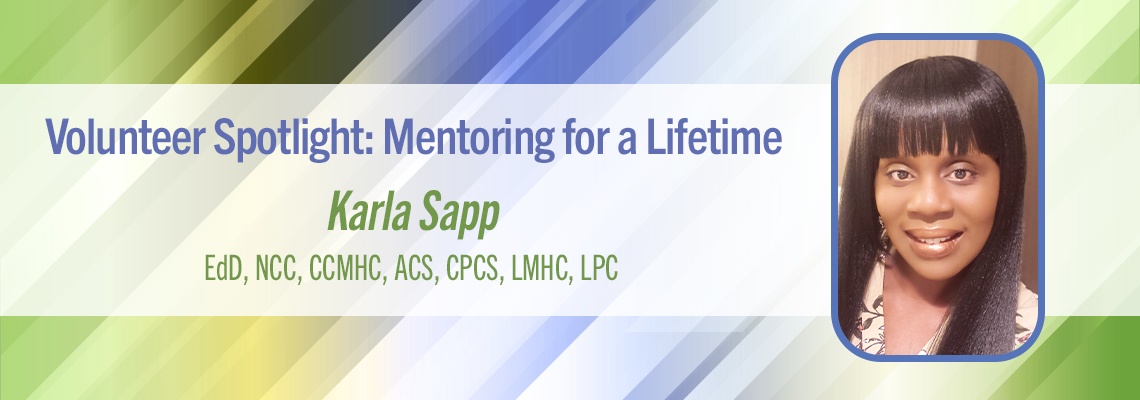
Foundation Connections

Volunteer Spotlight: Mentoring for a Lifetime
Published 7/21/2020
Dr. Karla Sapp began as an NBCC Foundation volunteer in 2014 and brings with her a wealth of knowledge and experience to her role as mentor, reviewer, and presenter. A graduate of Armstrong Atlantic State University, South University, and Argosy University, Dr. Sapp holds an array of licenses and specialty counseling credentials and is also a forensic mental health evaluator, qualified supervisor, and marriage and family therapist. She earned her Doctor of Education in counseling psychology from Argosy University and now owns her own practice, U Matter Consulting, Counseling, & Clinical Supervision.
Dr. Sapp specializes in mental health and addictions counseling in the inpatient acute hospitalization, outpatient, and drug court settings. She is currently a drug treatment specialist with the Federal Bureau of Prisons, where she works with incarcerated male offenders, and has also worked with the military population while providing inpatient services. Dr. Sapp, a scholarly practitioner, has research interests in men’s therapy, sports counseling, lifestyle choices and wellness, and disaster mental health/crisis counseling.
She has presented at a variety of conferences, including being a featured TED-style talk speaker at the 2019 Bridging the Gap Symposium, where she shared intimately about her work in federal prisons. Dr. Sapp has volunteered with the American Red Cross and has been a featured guest speaker with several community organizations focused on working with young women and their development of positive self-esteem. She is a mother and enjoys coaching her daughter in softball, as well as playing softball, reading, journaling, developing workshop presentations, spending time with family and friends, and watching NASCAR races both on TV and in person.
Her previous career as a juvenile probation officer was her catalyst to enter the mental health field. She saw a need for individuals in the correctional system to receive services they desperately needed to become their best, functional selves. This realization, in conjunction with familial experiences, drove Dr. Sapp to enter the mental health field as a counselor and subsequently, a volunteer.
When asked why she chooses to donate her time to the NBCC Foundation, Dr. Sapp acknowledges volunteering as a crucial element of her professional identity. She voices her desire to provide support and guidance to newly licensed clinicians and notes that this allows veteran counselors to give back to the profession in which they have invested so much time and energy.
Mentoring also provides much-needed support to counselors-in-training as they finish their program of study and enter the profession. Dr. Sapp believes mentoring to be mutually beneficial because it allows the veteran counselor to enhance their own knowledge, skill sets, and abilities. She shares that participation in volunteer activities increases one’s likelihood of success and continued growth, both personally and professionally, and she articulates her desire to be a part of the important network for counselors to develop and grow.
As a seasoned mentor, Dr. Sapp’s advice for new mentors is to “Take the time to develop and define your mentoring philosophy. Take the time to get to know your mentees and their goals and have confidence in your ability to mentor.”
Dr. Sapp’s overall mentoring philosophy is straightforward: “Allow the mentees to guide the session. By allowing the mentees to guide the sessions, they are more likely to engage and gain more from the relationship.”
Without question, she believes mentoring to be a critical part of professional development for new counselors and wishes others recognized the significance of the mentor–mentee relationship.
Her advice to new clinicians entering the profession is to “Develop a support system of clinicians who will hold you accountable. Have a willingness to accept feedback. Know or identify your ‘why,’ and cultivate your professional identity based off what drives you.”
There have been several highlights during Dr. Sapp’s time as a mentor, such as engaging in interview preparation with a mentee, which resulted in securing employment with their population of interest. Positive outcomes like this drive Dr. Sapp to continue contributing her time to counselors-in-training and reinforces her belief of how important it is for senior counselors to give back. She is also inspired by her mentees’ commitments to the profession, their populations of interest, and their desires to make a positive impact on their communities and clients they serve.
While Dr. Sapp acknowledges the benefits and desired outcomes of mentoring, she is transparent about the challenges she’s faced. She recognizes scheduling and work/life balance as a challenge for new clinicians and veterans.
Life happens, she says, and has a potential to disrupt the continuity of the mentoring relationship. These words could not ring truer currently as mental health professionals transition clinical and scholarly activities from in-person to online, and counselors-in-training adjust because of the current global pandemic.
As much of the counseling world shifts to online interactions, Dr. Sapp hasn’t missed a beat. She recently joined as a guest on the podcast Don’t Pardon My French, discussing emotional entanglements that can surface in relationships because of unaddressed trauma and addictions. She also served as the main speaker for an Instagram live “Self-Care Sunday” series from @PositiveVibesT.O, where she discussed the topic of coping and healing from racial trauma.

